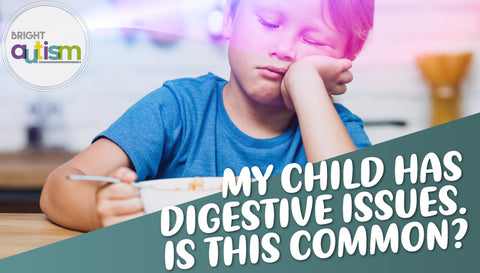
Yes, children with autism spectrum disorder (ASD) tend to have more medical issues, including gastrointestinal (GI) symptoms such as abdominal pain, constipation and diarrhea, compared with their peers.
Gastrointestinal Symptoms:

While some GI symptoms are obvious, others can be hard to detect in a young child or a child without the ability to describe the sensations s/he is experiencing. Symptoms of GI problems may include:
- Constipation
- Diarrhea
- Gas
- Abdominal pain
- Pain while stooling
- Nausea or vomiting
How GI Issues Impact Children on the Autism Spectrum:
Gastrointestinal symptoms can be painful, frustrating, and distracting. Children on the Spectrum lack the ability to explain their pain or discomfort, and so "acting out" becomes their only option.

In other words, GI symptoms can lead to negative behaviors, inattention, and other behavioral problems that are often linked to autism. The obvious conclusion: treating GI symptoms may often improve behavior, learning, and social skills in children with autism.
Behavioral problems, while significant, may be only the tip of the iceberg. Children with GI issues lose sleep, another contributor to learning and behavioral problems. And children with autism are much more likely than their peers to be hospitalized for problems like severe constipation.
Addressing GI Problems in Autistic Children

Because the reasons behind and the severity of GI problems vary, treatment varies. In some cases, the problem can be resolved with a simple stool softener. In other cases, however, a change of diet or further testing may be necessary.
Stress:
While you investigate physical problems, you can consider reducing stressful elements in your child's life. Some of these problems may not be obvious to you, so be sure to check in with your child and her teachers and therapists.

Common stressors include:
- Negative interactions with classmates such as bullying
- Difficulty with schoolwork (many children with autism have learning disabilities)
- Changes in routine (many children find change very challenging)
- Sensory challenges ranging from loud school buzzers to buzzing lights to strong smells from new carpets
- Changes such as a new school, new sibling, divorce, or a death in the family.
Picky Eating

There are many reasons why children with autism may be extremely picky eaters, but the most common seems to relate to sensory challenges and a desire for sameness. Whatever the reason, picky eating (especially when the child refuses any type of fruit or vegetable) can lead to GI symptoms such as constipation and gas. There are a number of parent-friendly approaches to addressing picky eating, but the reality is that these rarely work for children with autism. After giving these techniques your best shot, you may need to visit a feeding therapist.
Solving GI Problems
Parents and caregivers may try restrictive or elimination-type diets in an effort to manage symptoms or behaviors. Because restrictive diets increase the risk of nutrient deficiencies, they must be thoughtfully planned.

The goal for a child with ASD is the same as for any child: to provide adequate intake of all nutrients and promote lifelong health. To that end, the Academy of Nutrition and Dietetics has made the following recommendations:
- The child with ASD and the family should work with a dedicated care team that involves a dietitian. The team should assess the nutrient adequacy of the child's diet, keeping in mind that deficiencies may be present even if growth appears appropriate.
- The care team should work to address barriers, such as food selectivity, that may interfere with dietary changes to address allergies, constipation or other GI symptoms.
- Coaching about planning and preparing nutritious meals should involve the whole family.
RECOMMENDED PRODUCTS











1 comment
Hi my son who has slight asd doesnt always have pain in his stomach n doesnt suffer from bad toiletries. He is ok with his food but doesnt always eat it but not really picky eater,does like his puddings though.
Leave a comment